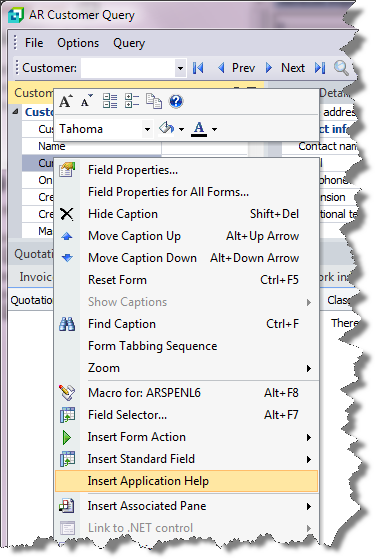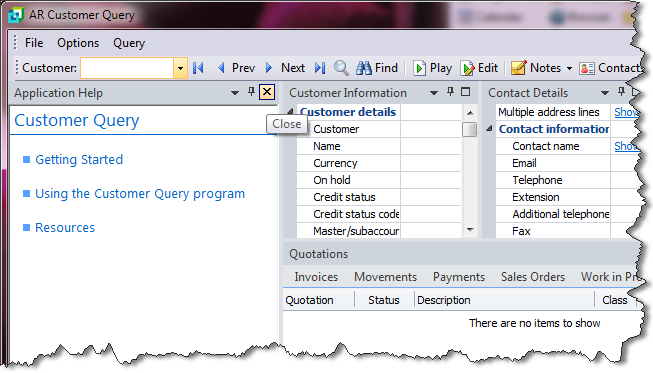You use this program to maintain contracts for specific customers and/or buying groups.
The contract pricing system takes precedence over all other pricing systems and the lowest price is applied if an inventory item is included in more than one buying group or customer contract.
- Toolbar and menu
- Contract Details (Buying Group)
- Contract Details (Customer)
- Pricing Methods
- Notes and warnings
- Application Help Pane
| Field | Description |
|---|---|
| New | Adds the contract details for another stock code. This applies when you select to add a contract for a single stock code in Add Contracts (Customers) or Add Contracts (Buying Groups). |
| Save | Saves any details that have changed. If you selected the: Load next stock code to add option (Add Contracts (Customers) or Add Contracts (Buying Groups)) then each time you select to save, the next stock code is displayed. Otherwise all stock codes included in the contract are updated with the details entered for the first stock code. |
| Prev / Next | Displays the previous or next contract price (if changing a contract price) or the next stock code (if adding a contract price). |
| Notes | Uses the Notepad Editor program to add free format text to the contract. |
This screen is displayed when you maintain a contract for a buying group.
| Field | Description |
|---|---|
| Contract details | |
| Buying group |
This indicates the buying group for which you are maintaining the contract. |
| Buying group description | This indicates the name of the buying group for which you are maintaining the contract. |
| Stock code | This indicates the stock code to which the contract price applies. |
| Stock code description | This indicates the description for the stock code to which the contract price applies. |
| Contract | This indicates the contract number you are maintaining. |
| Supplier | This indicates the supplier defined against the stock item. |
| Product class | This indicates the product class defined against the stock item. |
| Price method | This indicates the price method for the contract. Refer to Pricing Methods for additional details. |
| Start date | You use this field to indicate the date on which the contract is to become effective. |
| Expiry date |
You use this field to enter the date on which the contract will no longer be valid. An entry of 00/00/00 indicates that there is no expiry date. The Basis for contract pricing option (Sales Order Setup - Pricing tab), uses these Start and Expiry dates to determine the validity of the price for the contract when you process a sales order. |
| Field | Description |
|---|---|
| Configure contract |
If an automatic line discount is held against a contract pricing customer then the discount is not applied. However, you will be able to manually enter a discount. If an automatic order discount is held against a contract pricing customer, then the discount is applied upon completion of the order. |
| Customer | This indicates the code of the customer for whom you are maintaining the contract. |
| Customer name | This indicates the name of the customer for whom you are maintaining the contract. |
| Stock code | This indicates the stock code to which the contract price applies. |
| Stock code description | This indicates the description for the stock code to which the contract price applies. |
| Contract | This indicates the contract number you are maintaining. |
| Supplier | This indicates the supplier defined against the stock item. |
| Product class | This indicates the product class defined against the stock item. |
| Price method | This indicates the price method for the contract. Refer to Pricing Methods for additional details. |
| Start date | You use this field to indicate the date on which the contract is to become effective. |
| Expiry date |
You use this field to enter the date on which the contract will no longer be valid. An entry of 00/00/00 indicates that there is no expiry date. The Basis for contract pricing option (Sales Order Setup - Pricing tab), uses these Start and Expiry dates to determine the validity of the price for the contract when you process a sales order. |
The following options are displayed according to the price method defined against the contract:
| Field | Description | ||||
|---|---|---|---|---|---|
| Flat price | |||||
| Flat price | Enter the flat price to assign to the contract for the selected stock items. | ||||
| Price unit of measure | This indicates the price unit of measure for the flat
price.
|
||||
| Customer retail price |
This field is used for notational purposes only. It enables you to enter the suggested customer retail price for the stock item. This value can be printed on the detail section of sales order documents (see S/O Document Formats). This field is only enabled if you selected the options: Contract pricing and Customer/stock code cross-reference required against the customer (Browse on Customers - Options tab). |
||||
| Field | Description |
|---|---|
| Coded | |
| Price code |
Enter the price code you want to assign to the stock items assigned to the contract. Price codes for stock items are maintained using the Browse on Stock Code Pricing program. |
| Field | Description |
|---|---|
| Quantity discount breaks | |
| Quantity | Indicate the quantity to which the price code applies. |
| Price code |
Indicate the price code applicable to the corresponding quantity entered at the previous field. Price codes for stock items are maintained using the Browse on Stock Code Pricing program. |
| Discount percentage | Indicate the percentage discount applicable to the quantity/price code combinations entered. |
| Field | Description |
|---|---|
| List price less a percentage | |
| Percentage discount | This indicates the percentage discount that you want to apply to the list price for the stock items selected. |
| Field | Description |
|---|---|
| List price less chain discount | |
| First discount | Enter the first discount percentage to be applied to the list price of the stock item. |
| Second discount | Enter the second discount percentage to be applied to the list price of the stock item. |
| Third discount | Enter the third discount percentage to be applied to the list price of the stock item. |
| Field | Description |
|---|---|
| Coded less chain discount | |
| Price code |
Indicate the price code on which the chained discounts must be based. Price codes for stock items are maintained using the Browse on Stock Code Pricing program. |
| First discount | Enter the first discount percentage to be applied to the price code for the stock item. |
| Second discount | Enter the second discount percentage to be applied to the price code for the stock item. |
| Third discount | Enter the third discount percentage to be applied to the price code for the stock item. |
| Field | Description |
|---|---|
| Mark-up cost by a percentage | |
| Percentage mark-up | Enter the percentage amount by which the cost of the stock items assigned to the contract must be increased. |
| Field | Description |
|---|---|
| Coded less unit discount | |
| Price code |
Indicate the price code from which the unit discount value must be deducted. Price codes for stock items are maintained using the Browse on Stock Code Pricing program. |
| Unit discount value | Enter the unit discount value to apply to the price code of the item. |
-
This program can be accessed by selecting the Change option from the Contract Prices program.
Electronic Signatures provide security access, transaction logging and event triggering. This enables you to increase control over your system changes.
Access to the following eSignature transactions within this program can be restricted at Operator, Group, Role or Company level. You configure this using the Electronic Signatures program.
| eSignature Transaction | Description |
|---|---|
| SO Add contract pricing |
Controls access to the New and Add functions in the Contract Prices and Sales Order Contract Maintenance programs. |
| SO Change contract pricing |
Controls access to the maintenance of contract pricing in the Contract Prices and Sales Order Contract Maintenance programs. |
| SO Delete contract pricing |
Controls access to the Delete function in the Contract Prices and Sales Order Contract Maintenance programs. |
Application Help Panes provide step-by-step instructions for various functions within the program, including a brief overview of what the program does, what setup options are required and how to personalize the program. The intention is that the pane provides information that is uncluttered and easy to navigate.
You can embed an Application Help Pane:
-
in the main SYSPRO menu
-
in any program with panes, if not using roles
-
when adding a role layout in Design Mode.
Inserting Application Help
You would typically follow this procedure to display help for the current program in a customized pane that can be pinned to the program window.
Information includes step-by-step instructions for the various functions available within the program, including a brief overview of what the program does, what setup options are required and how to personalize the program.
-
Open the program for which you want to insert application help into a customized pane.
This functionality is only available for a program that has panes.
-
Right-click any form field.
You can also click the triangle menu icon that appears in the title area of a pane.
-
Select Insert Application Help from the context-sensitive menu.
The application help appears in a pane within your program. You can reposition the pane using the docking stickers or pin it to the program window.
Removing the Application Help pane
If you no longer want to display application help in a pane for your current program, you can simply remove it.
-
Select the Close icon in the right-hand corner of the application help pane.
-
Confirm that you want to delete the pane.
![[Note]](images/note.png)

